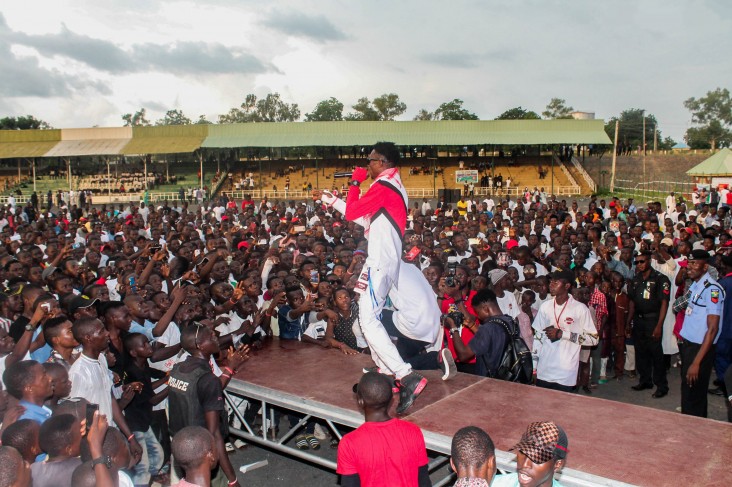Speeches Shim

August 2017—Boko Haram insurgency reached its peak in Nigeria’s Adamawa state in 2015. Two local government areas were under control of the extremist group while the insurgents continued to terrorize parts of the northeastern state, displacing thousands.
In 2017, the story is vastly different. Peace and normalcy are returning to a state once in fear of Boko Haram. Following military intervention that drove Boko Haram out of villages and into the forest, both local government areas have regained their freedom and schools are once again open and functional. Residents now have more confidence to gather publicly and have begun the process of rebuilding their lives.
The return of security is clearly illustrated by the numbers of internally displaced people who have returned home—a staggering 90 percent of the more than 140,000 displaced, according to the government.
To celebrate the return of peace and normalcy, USAID’s Office of Transition Initiatives recently partnered with the Adamawa State Ministry of Information and Strategy to host a musical concert. The concert, tagged Stand Against Violent Extremism (SAVE), targeted 5,000 youth in Adamawa who had lived through the insurgency.
Thousands gathered for the July 8 concert at the Ribadu national theater, where they received T-shirts and wristbands branded with peace messages. Government officials, including the state deputy governor, deputy speaker, head of service, and commissioner of information and strategy attended the event to highlight the government’s involvement in youth activities.
USAID worked with the ministry to book popular Nigerian Artists Ycee and Classiq to perform as headliners at the free concert. Media personalities Samantha Walsh of MTV Africa, DJ Bally and Miss Northeast Nigeria were also booked for the concert to encourage attendance and raise awareness of the themes of peace and countering violent extremism.
The event kicked off with a performance by the Adamawa state cultural troupe with a dance drama about peace, tolerance and unity. Musical guests performed next, thrilling the crowd with popular Nigerian songs. The concert received nationwide media coverage and was hailed for its innovative method of making the subject of peace appealing to youth.
Youth who had participated in USAID-sponsored activities were invited to participate as “VIPs” to demonstrate that being an ambassador of peace is “cool.” Youth of all ages, backgrounds and religions were united for a common goal as they sang along to the music, in what most described as a viable tool for peace promotion in the state.
“I am so happy. This has encouraged me to stay in peace because, if there is peace, there is happiness and development in the society,” said Lucy*, a young female attendee.
Phillip*, who traveled more than two hours from the local government area of Demsa just to attend the concert, echoed Lucy’s thoughts. “This event has increased my excitement about promoting peace and interacting with other ethnic groups within the state and beyond,” he said. “Two thumbs up for the government.”
One of the major impacts of violent extremism in northeastern Nigeria, and northern Adamawa in particular, is the loss of social fabric that binds people within and across communities. In the past, the government promoted patriotism through traditional commemorative days and holidays. The insurgency, however, affected the ability of communities to openly celebrate these events, which negatively affected relationships, trust and peaceful coexistence.
Since 2014, USAID has made considerable impact against insurgent groups Boko Haram and ISIS-West Africa, providing more than $57 million in stabilization assistance to help counter and prevent the factors that allow violent extremism to flourish, including feelings of marginalization and lack of economic opportunity.
*Last names omitted to protect security.
LINKS

Comment
Make a general inquiry or suggest an improvement.